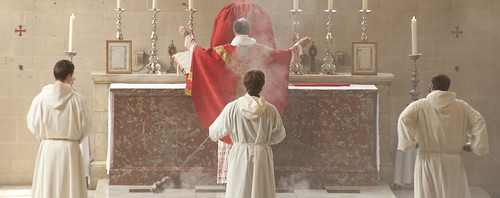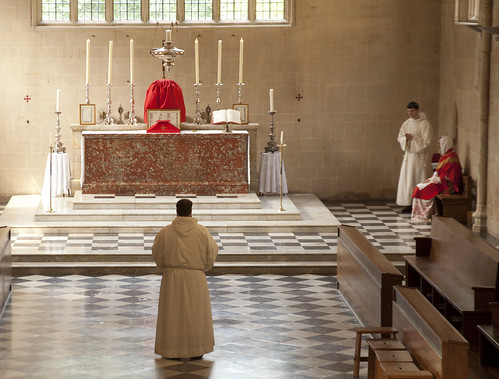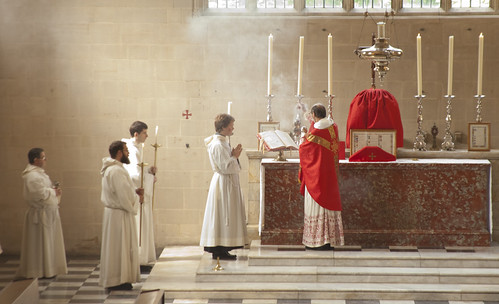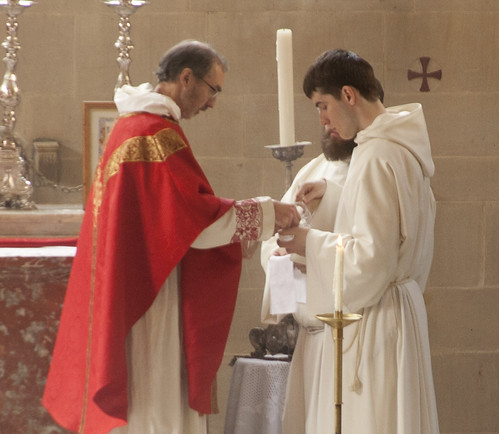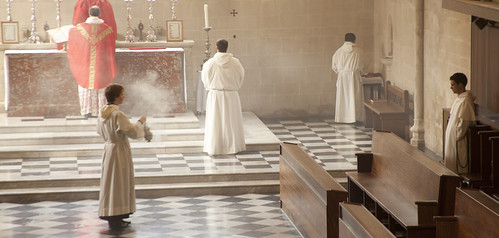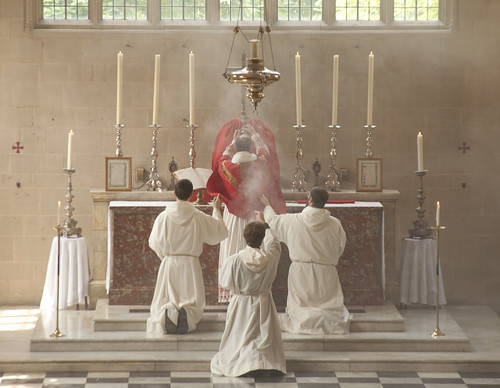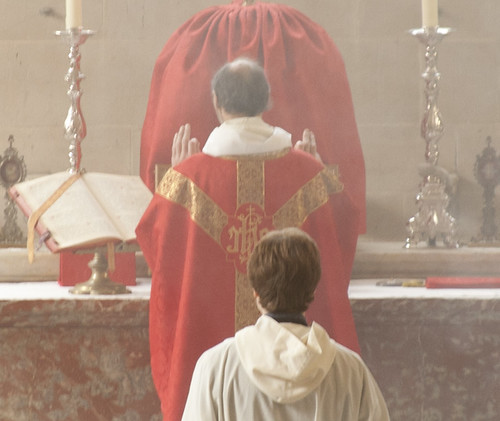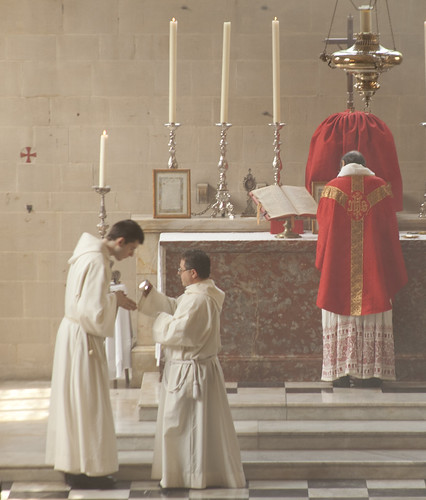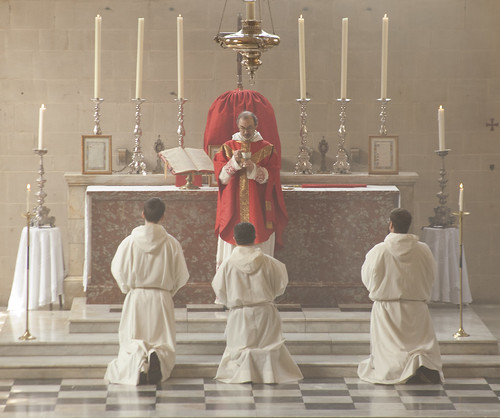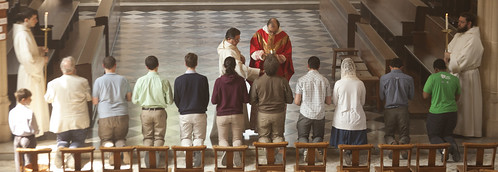Chairman's Blog
Stephen Bullivant's lapsation statistics: methodological problems
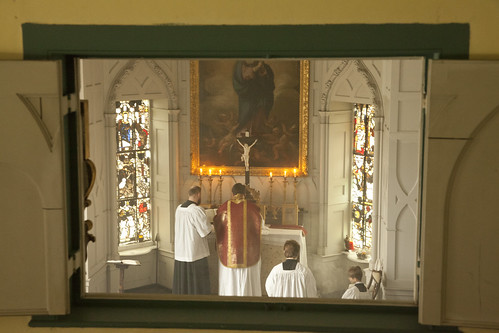 |
| A window into what is going on in the Church. |
Stephen Bullivant of the Benedict XVI Centre for Religion and Society has produced a study based on the British Social Attitudes Survey, focusing on the Catholic Church in England and Wales.
It is marred by some typographical errors, for example referring back to the wrong diagramme at one point, and saying 'somewhat under two in five [cradle Catholics] attends religious services once a week or more' (p14) when the figure is 17.1%. Thelittle video they've produced to go with it fails to explain what the percentages they are quoting are percentages of.
A general methodological point is we get individuals' views of whether they are Catholic, Anglican, or whatever, rather than any objective judgment based on belief and practice. An interesting result of this comes out with Baptists. For some reason Baptists are much less likely than Catholics and Methodists to say that they are Baptists if they aren't practicing. This means that the lapsation rate for Baptists is the highest of the groups identified: only 28.9% of cradle Baptists identify as Baptists. Conversly, the percentage of nominal Baptists who practice is also high: 58% go to church at least weekly, another 6% at least monthly. We've all met people who think of themselves as Anglicans, by contrast, even if their family has hardly set foot in church for generations. Accordingly, 51.7% of cradle Anglicans identify as Anglicans, but only 8.9% of self-identified Anglicans actually get themselves to a service once a week, with another 10% going at least once a month.
What this means--and this is something Bullivant appears not to have noticed--is that these figures are hugely influenced by attitudes to church membership: what people think it means to be an Anglican or a Baptist. The reality of how Baptists and Anglicans compare at retaining their young people is obscured by this. If Baptists suddenly decided that having a vague tribal loyalty to the Baptist milieu was enough for them to identity as Baptist, then their retention rate would shoot up and their rate of practicing would plummet. But these changes wouldn't reflect any changes in either belief or practice - except beliefs about church membership.
More helpful, then, are the figures for the church attendance of cradle Catholics. Here we find that 17.1% of cradle Catholics go to church once a week, and another 9.8% at least once a month. (56.8% of cradle Catholics identify as Catholics.) Unfortunately, this includes attendance at non-Catholic places of worship of the 6.1% cradle Catholics who have not just lapsed, but apostacised. Bullivant doesn't include comparable figures for Anglicans and others.
The trouble is, these figures are still affected by attitudes to church membership, just at one remove. What does it mean to be a 'cradle Catholic'? Baptism? Well, what does it take to get a couple to have their child baptised, and what does it take for a priest to carry out the baptism? The number of cradle Catholics who go on to lapse include those who were themselves brought up as only nomically Catholic. Children who go to a Catholic school on the basis of parents' wholly theoretical affiliation to the Church will often, presumably, say they were cradle Catholics: they were, at any rate, baptised, and probably confirmed. But you can hardly be said to lapse from the practice of the Faith if you never practiced in the first place.
Consider the debate about whether the babies of lapsed Catholics should be baptised. Parents (or godparents) have to say that the child will be brought up in the Faith. For a priest to baptise a child solely because his parents want him to go to a good school, or to please granny, is sacrilege. But how are priests to determine the good will of parents? Naturally, a range of pastoral responses are possible, and there is variation by region and over time. These variations are going to feed through into the figures for lapsation twenty years later. Laxer policies will lead to higher lapsation rates; a region of the country or period of time characterised by a stricter policy will have a lower lapsation rate. That isn't to say that a laxer policy is a bad thing: personally I agree with the Pope that priests must take parental professions of their intentions at face value, unless there are strong reasons not to do so. More nominal Catholics may, if carefully handled, lead to more real Catholics. My point is simply that the lapsation figures are being distorted by factors which have got nothing to do with how effective catechesis is, how attractive the liturgy, the social standing of the Church, and so on: the things which we may have thought we were measuring when measuring the rate of lapsation.
The baptism of children to get them into Catholic schools (or to please granny) is no marginal phenomenon in the Church in England and Wales, but of course it is impossible to estimate an accurate figure for it. What we do know is that it artificially inflates the number of nominal Catholics and the lapsation rate alike. What we really need are figures for those brought up as practicing their religion (at least, going to church), who continue to practice as adults. For this we'd need to a new study.
We do get some hints about this, however, from Bullivant's figures, and tomorrow I will address them, by looking at age and gender profiles of practicing Catholics.
Support the work of the LMS by becoming an 'Anniversary Supporter'.
The Inquisition: something everyone should expect
The latest from Lux, made for EWTN.
'The series will be premiered by EWTN in October of 2016 and is a four episode docudrama. It was filmed across Europe in 2015 and was completed in early 2016. It is perhaps our most ambitious yet with live action.'
EWTN's new docudrama series explores the history of the Inquisitions. What they were, why were they set up, and why have they acquired such a bad reputation today? Indeed if the modern media are to be believed the Inquisitions, particularly the Spanish Inquisition, are laced with images of cruelty, terror and religious fanaticism. However, these images are false, a misrepresentation developed over four centuries ago by Protestant Northern Europe as part of the propaganda campaign against the Catholic Church, and perpetuated ever since. This new four part original film was shot on location in six countries across Europe. It uses drama sequences and interviews with leading historians and churchmen to reveal the truth.
Support the work of the LMS by becoming an 'Anniversary Supporter'.
Fr Rosica: are liberal and conservative blogs cesspools of venom, hatred, and vitriol?
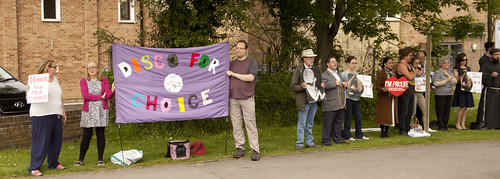 |
| Conflict is inevitable. Here is the Oxford Pro-life Witness last Saturday, with attendant counter-demonstration, who try to stop us praying by playing music. |
Never one to ignore the mote in someone else's eye, Fr Dwight Longenecker has used comments by Fr Thomas Rosica about how horrid the internet can be to attack 'traditionalists', and lists his least favourite blogs as examples.
It is interesting to note, however, that Fr Rosica does not single out traditionalists, and I think it is extremely unlikely that he has ever sampled the wares of little-read, marginal figures like Mundabor, 'Novus Ordo Watch', and 'TradCathKnight', mentioned by Longenecker. The Crux article reporting his remarks noted, instead, his conflict with 'conservative and pro-life' sites. This is Fr Rosica's description of what he doesn't like:
the obsessed, scrupulous, self-appointed, nostalgia-hankering virtual guardians of faith or of liturgical practices are very disturbed, broken and angry individuals, who never found a platform or pulpit in real life and so resort to the Internet and become trolling pontiffs and holy executioners!
1. 'The author of the piece hates Francis with a white hot passion, a fact that must be as surely known to her editors as to anyone else with a pulse capable of reading her many literary acts of voiding her rheum in the Holy Father’s face.'
2. (Talking about people attending the Traditional Mass.) [They look] like an escapee from an Amish farm. If mainstream Catholics who attend usus antiquior Masses feel as though they have landed on the set of a movie based in a nineteenth-century American mid-west or Pennsylvanian town, populated by Protestants who have a problem with modern forms of transport...
3. (Critics of female altar servers):
5. Fr Dwight Longenecker: the man himself
Support the work of the LMS by becoming an 'Anniversary Supporter'.
Dominican Missa Cantata for Bl Margaret Pole: photos
A gesture characteristic of the Dominican Rite, and not found in the Roman Rite: just after the Consecration.
Mass last Saturday was for Bl Margaret Pole, Countess of Salisbury, executed by Henry VIII out of hatred for the Catholic Faith on 28th (or 27th) May 1541. She was the daughter of George, Duke of Clarence - the one done to death in butt of wine in Shakespeare's Richard III (and, extraordinarily, probably in real life as well). Henry VII married her off to a loyal relation of his, Richard Pole, and she became lady in waiting to Catherine of Aragon, both during Catherine's engagement to Prince Arthur, who died, and when she was married to Henry VIII. Margaret's son Reginald Pole, in holy orders on the continent, wrote against the break with Rome, and two of her other sons were executed for treason (ie, Catholic sympathies).
As a Plantagenant, a Catholic, an associate of Queen Catherine, and the mother of Cardinal Pole, Henry VIII had no shortage of reasons to hate her. Nevertheless she remained in the Tower for two years before the king ordered a hasty and almost botched beheading, when she was 67.
This was the first Dominican Missa Cantata I have attended. The Epistle was sung by a cleric.
Another characteristic of the Dominican Rite: the use of the Paxbrede at the kiss of peace, for clergy, servers, and religious in choir. In the Roman Rite the Pax is normally given by the 'emplexus', embrace, but this only happens at Solemn Mass. The Roman Rite does use the Paxbrede for Prelates sitting in choir in Low Mass, and interesting the Pax is extended to the congregation using the Paxbrede in Spain and its former possessions, as was the practice in England in the Middle Ages.
Support the work of the LMS by becoming an 'Anniversary Supporter'.
Worship towards the East: video
Cardinal Robert Sarah has reopened the debate on the best 'direction' for worship, favouring the direction of 'liturgical east', the same direction as the Faithful in the nave, over 'versus populum', facing the people over the Altar like an executive facing his underlinings over a desk.
He said in an interview: “But as soon as we reach the moment when one addresses God – from the Offertory onwards – it is essential that the priest and faithful look together towards the east. This corresponds exactly to what the Council Fathers wanted.”
In honour of this occasion I repost a video recorded in 2014. To learn more on the theology and history of the debate, see the FIUV Position Paper here.
Support the work of the LMS by becoming an 'Anniversary Supporter'.
New book: God of the Gulag by Jonathan Luxmoore
 Any book shining a light on the heroic witness of those killed for their Christian faith under Communism is to be welcomed. This major two-volume work is especially so, because of its comprehensive coverage of Soviet and Soviet-bloc persecution.
Any book shining a light on the heroic witness of those killed for their Christian faith under Communism is to be welcomed. This major two-volume work is especially so, because of its comprehensive coverage of Soviet and Soviet-bloc persecution.
Well done to Jonathan Luxmoore, otherwise known for his occasional news stories in the Catholic press. The publication of this work marks the culmination of a massive project of research and writing.
The book is available from Amazon (Vol 1, Vol 2) and directly from Gracewing.
----------------------------------
God of the Gulag, by Jonathan Luxmoore
Volume 1: Martyrs in an Age of Revolution
The eight decades from the Bolshevik Revolution to the collapse of the Iron Curtain brought a wave of anti-religious repression comparable to anything seen in the fabled persecutions of the first Christian centuries. It inflicted sufferings and agonies equalling those of the darkest periods; and it stimulated writings and reflections paralleling the most insightful and moving from Christian history. This first volume of The God of the Gulag shows how the paradigms of persecution and martyrdom were established in the Early Church, when Christians were hounded by the Roman state as a threat to the established order-and how they reappeared when anti-Christian persecution returned on a mass scale after the French Revolution, as new hostile states and popular movements tried again to dismantle the power and influence of the Christian Church. Drawing on accounts and documents in many languages, it examines the first phase of communist rule after the 1917 Russian revolution, when a ruthless campaign was launched to destroy all organised religion and redirect spiritual strivings towards an absolute subservience to the Marxist vision. It looks at how Christians attempted to defend the Church and witness to their faith as the communist dictatorship was extended under Stalin to post-War Eastern Europe, bringing a new wave of arrests, trials and purges.
9780852446393 - 536 pages £20.00

Volume 2: Martyrs in an Age of Secularism
By the end of the 1950s, more than four decades had passed since Lenin and his Bolshevik followers had first seized power in Russia. Open brutality and terror had given way to administrative forms of repression and control. But the aim of communism was still very much alive-to create an egalitarian society ruled by the working class under the direction of the Party avant-garde. Intimidation and coercion by the secret police were still indispensable tools for pursuing that aim. Hostility to the Church and contempt for religious faith were still fundamental to the communist programme. This second volume of The God of the Gulag details the continuing campaign against the Church and its members, as the age of revolution gave way to an age of secularism, and new efforts were made to impose scientific atheism and rid the world of religious superstition. Drawing on accounts and documents in many languages, it shows how the requirements of Christian witness evolved as the policies and tactics of the one-party state developed, and how Church leaders sought new ways of sustaining religious life after the 1962-5 Second Vatican Council. It recounts how growing dissent was strengthened by the shock-election of a Polish Pope in 1978 and the rise of the Solidarity movement two years later, and how the bitter and protracted endgame of communist rule was played out in the 1980s. It assesses the lessons to be learned by the Church and its opponents from this modern era of persecution and martyrdom; and it looks at how the heroic testimony of the twentieth-century martyrs should be recognised and commemorated.
9780852445846 - 484 pages £20.00
Support the work of the LMS by becoming an 'Anniversary Supporter'.
Video of Cardinal Burke celebrating Low Mass in Oxford
I posted a number of photos here; I have finally posted up a short video, including snatches of the very lovely music sung on this occasion.
Support the work of the LMS by becoming an 'Anniversary Supporter'.
Would you like to edit Mass of Ages?
The Latin Mass Society was incredibly lucky to secure Dylan Parry, long-standing editor of
Westminster Cathedral's magazine Oremus, to edite Mass of Ages. Now Dylan, for positive rather than negative reasons, is moving on, and we need a new editor to carry on his work.
Vacancy for a Managing Editor, Mass of Ages
Support the work of the LMS by becoming an 'Anniversary Supporter'.
What sort of Mass did 'Vatican II' want?
| The Traditional Mass on the Chatres Pilgrimage. Not as off-putting to young people as Pope Paul VI imagined. Photo by John Aron. |
Liturgical conservatives and progressives argue endlessly about this. Their argument will never be resolved, both because Sacrosanctum Concilium was and the subsequent magisterium has been self-contradictory, but also because neither side in the debate is willing to be honest about the historical facts. I am sorry to be harsh, but having read the output of both sides of the debate over a number of years, it is time it was said.
First, Sacrosantum Concilium: how is it self-contradictory? It makes few concrete suggestions, but it does make some. It calls for wider use of the vernacular (63); the removal of 'useless repetition' (34), and a more 'lavish' presentation of the Scriptures in the readings, arranged 'prescribed number of years' (51). It leaves further details to local initiative and an official commission. On the other hand, it says (23)
there must be no innovations unless the good of the Church genuinely and certainly requires them; and care must be taken that any new forms adopted should in some way grow organically from forms already existing.
It is perfectly obvious that the this double condition is not satisfied by the concrete suggestions the document itself makes. There is no precedent in the liturgical tradition of the Church, in any Rite, for a multi-year lectionary, and to suggest that such a thing could grow 'organically' out of a single-year lectionary is obviously absurd. There is no precedent for a mixing of Latin and the vernacular in the liturgy, or for the liturgy to be translated into dozens of vernaculars for different countries. The principle militating against 'useless repetition' is entirely foreign to the Church's liturgical tradition. And none of these changes could possibly, in advance, be said to be required 'genuinely and certainly' by the good of the Church.
From this fundamental self-contradiction, you can draw any conclusion you like. Perhaps the 'general principle' of section 23 should control our interpretation of the specific examples of reforms; perhaps it is the other other way around. The fact is, there is no coherent programme of reform in Sacrosanctum Concilium. Let's not engage in make-believe. It is a compromise document with provisions pointing in different directions.
It was, however, interpreted by those appointed to interpret it, and the Novus Ordo Missae was signed off by Pope Paul VI. So what liturgical style are we guided towards by the official documents, documents of the 'living magisterium' as the conservatives like to call them, which accompanied and followed the promulgation of the new missal?
Well, these documents too are mutually contradictory. The architect of the reforms, Archbishop Annibale Bugnini, made a great deal of the provision of Sacrosanctum Conciium 34:
The rites should be distinguished by a noble simplicity; they should be short, clear, and unencumbered by useless repetitions; they should be within the people's powers of comprehension, and normally should not require much explanation.
This is his justification for rewriting practically every Latin prayer in the Missal, and then authorising its translation into kindergarten English: projects which were, of course, officially approved and given authoritative promulgation by the Church's Supreme Legislator, the Pope. Where does the 2011 'new translation' come from? It comes from a much later document, the 2001 Instruction Liturgiam authenticam which states (27):
|
If indeed, in the liturgical texts, words or expressions are sometimes employed which differ somewhat from usual and everyday speech, it is often enough by virtue of this very fact that the texts become truly memorable and capable of expressing heavenly realities.
|
The fact has to be faced: in proposing a 'hieratic', 'sacred' liturgical register, it introduces a liturgical principle for the guidance of translators which simply is not to be found in Sacrosanctum Concilium or in the numerous documents of the 1970s and 1980s, documents like the toe-curling Directory for Masses with Children in 1973. There had been a massive conservative push-back in the 1990s and Liturgicam authenticam was the result. So patent was the contradiction between the two eras that Liturgicam authenticaum actually abrogated a whole raft of official guidance from before 1994:
|
8. The norms set forth in this Instruction are to be substituted for all norms previously published on the matter,
|
We need to face the fact: the magisterium's own interpretation of Sacrosanctum Concilium is a moving target. It was quite different in the 1970s than it was by the mid 1990s. Who knows where it will be in ten years?
Let me give a couple more examples: on the use of Latin and on Gregorian Chant.
Latin: for. Sacroscantum Concilium
36. 1. Particular law remaining in force, the use of the Latin language is to be preserved in the Latin rites.
101. 1. In accordance with the centuries-old tradition of the Latin rite, the Latin language is to be retained by clerics in the divine office.
Pope John Paul II: Dominicae Cenae (1980) 10:
[Latin is] an expression of the unity of the Church and through its dignified character [it] elicited a profound sense of the Eucharistic Mystery. ...The Roman Church has special obligations towards Latin, the splendid language of ancient Rome, and she must manifest them whenever the occasion presents itself.
Instruction Ratio fundamentalis institutionis sacerdotalis (1980):
the Council is far from having banned the use of the Latin language. Indeed, it did the contrary. Thus the systematic exclusion of Latin is an abuse no less to be condemned than the systematic desire of some people to use it exclusively. Its sudden and total disappearance will not be without serious pastoral consequences.
Latin: against. Pope Paul VI, Nov 26 1969
No longer Latin, but the spoken language will be the principal language of the Mass.
If the divine Latin language kept us apart from the children, from youth, from the world of labor and of affairs, if it were a dark screen, not a clear window, would it be right for us fishers of souls to maintain it as the exclusive language of prayer and religious intercourse?
Dozens of official references to the allegedly beneficial effect of putting the liturgy in the vernacular, as something done by the Council, could be cited.
Chant: for. Sacrosanctum Concilium
116. The Church acknowledges Gregorian chant as specially suited to the Roman liturgy: therefore, other things being equal, it should be given pride of place in liturgical services.
Pope Paul VI: Sacrificium laudis 1966 (to religious superiors)
One can also wonder whether men would come in such numbers to your churches in quest of the sacred prayer, if its ancient and native tongue, joined to a chant full of grave beauty, resounded no more within your walls.
Paul VI Voluntati Obsequens 1974
... the liturgical reform does not and indeed cannot deny the past. Rather does it "preserve and foster it with the greatest care." It cultivates and transmits all that is in it of high religious, cultural and artistic worth and especially those elements which can express even externally the unity of believers.
Chant: against. Pope Paul VI, Nov 26 1969:
We will lose a great part of that stupendous and incomparable artistic and spiritual thing, the Gregorian chant.
Instruction Concerts in Churches 1987:
There is a way of reading these documents which minimises the tension, for example by saying that Latin and Chant be used in a few places, but not for 'most' of the Mass: Paul VI mentions the singing of the Creed and the Our Father. But the attitudes underlying these documents make perfectly reasonable the more extensive application pushed by conservatives and progressives, in opposite directions.
If Latin and Chant are powerful and profound, if they exemplify unity and foster vocations, and if the reform was not about breaking with the past but 'fostering' our traditions, why not have Latin propers chanted, and why not have the Canon, or indeed the whole of Mass, in Latin?
On the other hand, if participation requires comprehension without, usually, any explanation, and if the former liturgical practice failed to appreciate this - if it was like a 'dark screen' - then Latin and Chant have no place in the Mass at all.
Those seeking, in Conciliar and post-conciliar documents, guidance on liturgical principles, with a view to the way Mass should be celebrated, and perhaps with a view to future reform, should stop right here. There is no single, coherent, vision of the liturgy in these documents. There is, instead, a debate. In the end, one side of this debate must win, and the other side must lose.
I would like to appeal to the 'reform of the reform' writers, and to the progressives on Pray Tell and elsewhere: stop accusing each other (and traditional Catholics) of contradicting authoritative documents and the 'real' principles of Vatican II. On this subject, arguments from authority will get us nowhere.
The only way to think with the Church on the liturgy is to take a longer view: to look at what the Church has done, not over a few decades, but over millennia. The very idea of doing this, of course, contradicts the claim that everything up to 1965 was bad. But it is that idea, rather than an honest appraisal of the modern liturgical documents considered here, that is really troubling for the doctrine of the indefectability of the Church. If the Church was wrong up to 1965, why pay any attention to what she has said since then?
Support the work of the LMS by becoming an 'Anniversary Supporter'.
The OF and the EF: how they are related
Today I repost this from 2013, partly in response to two things which I saw on social media, from conservative Catholics about the Novus Ordo. Here, Fr Richard Heilman wishes that the Ordinary Form be celerbated like 'the actual Mass of Vatican II'. This turns out to be a reference to the 1965 liturgical books, which may have been celebrated during the latter part of the Council, but certainly isn't what the Council wanted the Mass to be like. Here, John Allen quotes a priest praising the new translation because it faithfully renders the Latin prayers, 'considering the antiquity and universal usage of these prayers'. But very few ancient Latin prayers survived unscathed into the Novus Ordo.
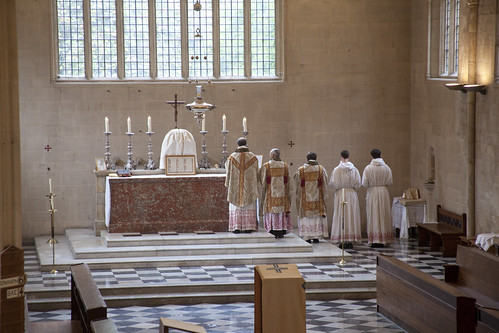 |
| Dominican Rite: lining up side by side, not, as with the Roman Rite, one behind the other. |
I've received a comment on my last post:
'Joseph, for the benefit of readers, could you list some of those features which the Novus Ordo lacks -- "features ... so centrally characteristic of the Roman Rite that anything lacking them has to be categorised as something else"? I'd like to hear the features that strike you as characteristic in such a way that the two forms would be divided by having or lacking them.'
This is a fair question, and I didn't address it the other day only for reasons of space. Here is a nice reply by the liturgical scholar and Latinist Philip Goddard, in a letter in the Catholic Herald from a couple of years ago (29 April 2011):
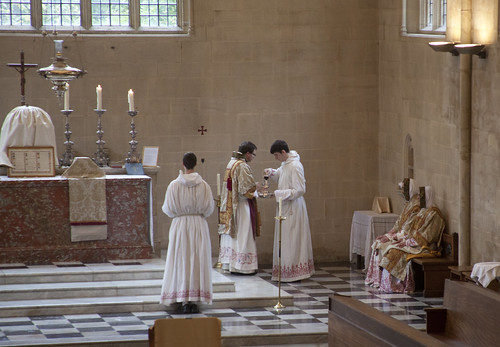 |
| Water and wine added to the Chalice (at High Mass) during the Gradual and Alleluia, not at the Offertory. |
'Although I agree with much of what Fr Leo Chamberlain says (Letter, April 1), especially about the the effects of relativism on religious faith and practice, I do not see how he can seriously maintain that the new Roman rite is in accordance with tradition.
In the Roman tradition Mass is celebrated in Latin: in the New rite it is normally in the vernacular. In the Roman tradition the celebrant faces East: in the New rite he almost always faces versus populum. In the Roman tradition there is a single annual cycle of readings: in the New rite there is a triennial cycle. In the Roman tradition the non-Gospel readings are recited or sung by an ordained minister; in the New rite they are recited by a layman. In the Roman tradition there is a single Eucharistic Prayer; in the New rite there are many. In the Roman tradition Holy Communion is received kneeling, on the tongue, from an ordained minister; in the New rite is it generally revived under both kinds, standing, in the hand, and often from a lay minister. In the Roman tradition the service of the altar is restricted to males; in the New rite it is open to both sexes. One could go on and on listing the differences, if space permitted.
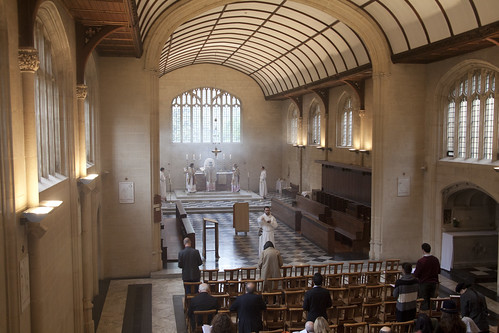 |
| Thurible raised and lowered, not swung. |
No doubt Fr Chamberlain would argue that some, or even all, of these innovations are beneficial. That is as may be. Traditional, however, they are not.'
(There's more about this correspondence with Fr Chamberlain, in which I was also involved, here.)
It is sometimes said that continuity is preserved in part because many of the innovations listed are not obligatory. It is possible to celebrate the Novus Ordo entirely in Latin, with male servers, ordained readers, and the like. But comparing rites is a matter of comparing the body of rubrics, texts, and rules, and common practice, and those rubrics, texts, and rules, and the common practice, are radically different. It is would be absurd to deny that the Mozarabic Rite was a separate Rite because, under some options under some peculiar liturgical circumstances, it can be said in a way quite similar to the Roman Rite under another set of options and peculiar circumstances. It is different because of the differences.
 |
| The Kiss of Peace administered using a 'paxbrede', not an embrace. |
And of course the very fact that there are all these options is another radical break with the tradition of the Roman Rite. The priest can never choose between languages, Eucharistic Prayers, Prefaces, or readings, in the Roman liturgical tradition. This is an extremely important part of that tradition, which is essential to the character of the Traditional Mass as something given to us by the Church, not thought up on the spot by a liturgy committee.
Finally, when saying they are different one should bear in mind the kinds of differences which as a matter of course justify scholars in saying that the Byzantine and the Maronite Rites, or whatever, are different Rites. Obviously they are all rites of Mass. Obviously they all have important features in common - the features common to all rites of Mass, or to many of them. The differences may even seem subtle, if you leave the language of the Mass aside. There are re-arrangements of some elements (when i the Pax takes place, for example); some things are added in one and excluded from another. They are all good and pious rites of Mass, they are just different.
The Novus Ordo, it has often been pointed out, is more different from the 1962 Mass than the latter is from a number of Rites which are nevertheless agreed to separate Rites.
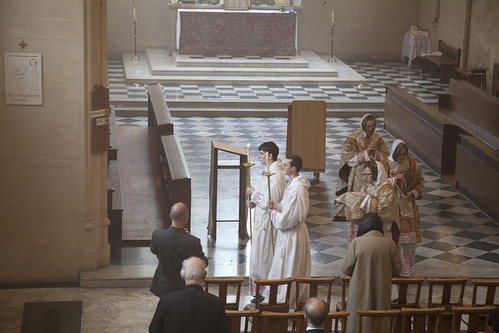 |
| Hoods raised processing in and out. |
I am of course very familiar with the argument in favour of continuity, and the people making it are often doing so for noble reasons. We must remember, however, that the greatest exponent of the 'hermeneutic of continuity', Pope Benedict XVI, was also the man who did more than anyone to make the reality of the liturgical rupture part of the respectable debate. The hermeneutic of continuity is not about denying the fact of change before our eyes; it is about accepting the tradition stretching into the past as a living part of the Church's patrimony, which conditions how we understand the teaching of the Second Vatican Council, and indeed the rest of our experience.
Photos: High Mass in the Dominican Rite. The question of whether the Dominican Rite and the Roman Rite are really separate Rites, or whether the former is a 'Use' of the latter, is debated, on historical grounds: where did the Dominican Rite come from? But these are the kinds of differences which are significant between one Western Rite and another.

